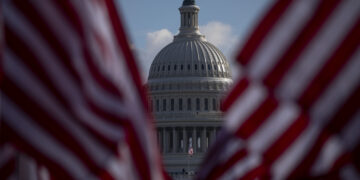
Joe Biden can point to a few concrete foreign-policy accomplishments during his presidency thus far. Ukraine would be in far worse shape against Russia were it not for the financial, economic and military assistance the White House has provided. Washington has also done a commendable job getting Japan and South Korea back on speaking terms after years of bickering.
Yet both of these items are tactical in nature and aren’t going to bring Biden into the history books. Shepherding a comprehensive normalization agreement between Israel and Saudi Arabia, however, just might. That was, until an unprecedented Hamas-led attack into Israel threw a wrench into his plans.
Before those brutal, coordinated attacks over the weekend, senior US officials believed an Israel-Saudi accord, if finalized, would be an earth-shattering moment akin to the infamous 1979 peace deal between Israel and Egypt. Secretary of state Antony Blinken, national security advisor Jake Sullivan and Brett McGurk, Biden’s top Middle East advisor on the National Security Council, have all traveled to the kingdom repeatedly hoping to nail down a prospective deal. Blinken has called the diplomatic effort a top US priority and heralded the emergence of a successful process as one with “transformative” potential. At times, Washington has appeared more gung-ho about normalization than the Israelis and Saudis have.
Would Israel and Saudi Arabia formalizing their relationship serve the US interest? This question may be entirely academic today. Israel’s first, second and third priorities is now to snuff out Hamas in the Gaza Strip in retaliation for the worst day of violence in Israeli history since the 1973 Yom Kippur war. With up to 300,000 Israeli reservists now called to duty for what will likely be a bloody, tough and long ground invasion of the highly-populated enclave, everything else — including normalizing ties with Saudi Arabia — will be on the back-burner.
Author

Daniel
DePetris
Fellow
More on Middle East

December 28, 2024
Events on Israel





